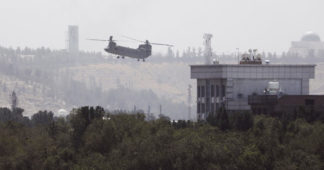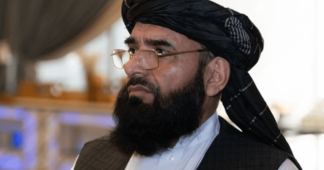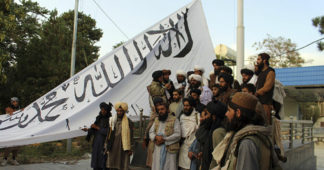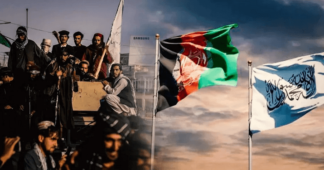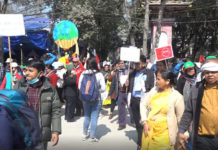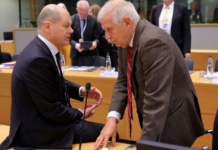Western politicians and media colluded in duping their publics into believing Afghanistan was a ‘winnable war’
By JONATHAN COOK
Aug 19, 2021
A month ago, as the US army prepared to end the 20-year occupation of Afghanistan and hand over responsibility to local security forces it had armed and trained, maps showed small, relatively isolated pockets of Taliban control.
At the weekend, the Islamist fighters marchedunchallenged into Afghanistan’s capital, Kabul, bringing almost the entire country under their thumb. US intelligence assessments that it would take the Taliban up to three months to capture Afghanistan’s capital proved wildly inaccurate.
It took a few days.
Foreign nationals were left scrambling to Kabul’s airport while American officials were hurriedly evacuated by helicopter, echoing the fall of Saigon in 1975, when US embassy staff were chased out of South Vietnam after years of a similarly failed war.
On Sunday Afghan President Ashraf Ghani issued a statement that he had fled the country – reportedly in a helicopter stuffed with cash – to “avoid bloodshed”. But all the evidence indicates his corrupt security forces were never in a position to offer serious resistance to a Taliban takeover.
Jumping ship
The speed with which the Taliban have re-established their hold on a country that was supposedly being reconstructed as some kind of western-style liberal democracy is astonishing. Or, at least, it is to those who believed that US and British military commanders, western politicians and the mainstream media were being straight all this time.
The real explanation for the Taliban’s “surprise” success is that western publics were being duped all along. The United States’ longest war was doomed from the start. The corrupt, entirely unrepresentative members of the Kabul elite were always going to jump ship as soon as Washington stopped pumping in troops and treasure.
According to Forbes magazine, as much as $2 trillion was poured into Afghanistan over the past 20 years – or $300m a day. The truth is that western politicians and the media intentionally colluded in a fiction, selling yet another imperial “war” in a far-off land as a humanitarian intervention welcomed by the local population.
As Daniel Davis, a former US army lieutenant colonel and critic of the war, observed at the weekend: “Since early 2002, the war in Afghanistan never had a chance of succeeding.”
Nonetheless, many politicians and commentators are still sounding the same,tired tune, castigating the Biden administration for “betraying” Afghanistan, as if the US had any right to be there in the first place – or as if more years of US meddling could turn things around.
Colonial chessboard
No one should have been shocked by the almost-instant collapse of an Afghan government and its security services that had been foisted on the country by the US. But it seems some are still credulous enough – even after the catastrophic lies that justified “interventions” in Iraq, Libya and Syria – to believe western foreign policy is driven by the desire to assist poor countries rather than use them as pawns on a global, colonial chessboard.
Afghans are no different from the rest of us. They don’t like outsiders ruling over them. They don’t like having political priorities imposed on them. And they don’t like dying in someone else’s power game.
If the fall of Kabul proves anything, it is that the US never had any allies in Afghanistan outside of a tiny elite that saw the chance to enrich itself, protected by US and British firepower and given an alibi by western liberals who assumed their own simplistic discourse about identity politics was ripe for export.
Yes, the Taliban will be bad news for Afghan women and girls – as well as men – who are concerned chiefly with maintaining personal freedom. But a tough conclusion western audiences may have to draw is that there are competing priorities for many Afghans who have suffered under decades of invasions and colonial interference.
Just as in Iraq, large segments of the population appear to be ready to forgo freedom in return for a guarantee of communal stability and personal safety. That was something a US client regime, looking to divert aid into its own pockets, was never going to guarantee. While the US was in charge, many tens of thousands of Afghans were killed. We will never know the true figure because their lives were considered cheap. Millions more Afghans were forced into exile.
Spoils of war
Nothing about western intervention in Afghanistan has been as it was portrayed. Those deceptions long predate the invasion by the US and UK in 2001, supposedly to hunt down Osama bin Laden and his al-Qaeda fighters following the 9/11 attacks on the World Trade Centre.
Seen now, the attack on Afghanistan looks more like scene-setting, and a rationalisation, for the illegal invasion and occupation of Iraq that soon followed. Both served the neoconservative agenda of increasing the US footprint in the Middle East and upping the pressure on Iran.
The West has long pursued geostrategic interests in Afghanistan – given the country’s value as a trade route and its role as a buffer against enemies gaining access to the Arabian Gulf. In the 19th century, the British and Russian empires used Afghanistan as the central arena for their manoeuvring in the so-called“Great Game”.
Similar intrigues drove US-led efforts to expel the Soviet army after it invaded and occupied Afghanistan through the 1980s. Washington and Britain helped to finance, arm and train Islamist fighters, the mujahideen, that forced out the Red Army in 1989. The mujahideen went on to oust the country’s secular, communist government.
After their victory against the Soviet army, the mujahideen leadership split, with some becoming little more than regional warlords. The country was plunged into a bloody civil war in which the mujahideen and warlords looted their way through the areas they conquered, often treating women and girls as the spoils of war.
Despite Washington officials’ constant trumpeting of their concern at Taliban violations of women’s rights – in what became an additional pretext for continuing the occupation – the US had shown no desire to tackle such abuses when they were committed by its own mujahideen allies.
Rule of the warlords
The Taliban emerged in the 1990s from religious schools in neighbouring Pakistan as civil war raged in Afghanistan. They vowed to end the corruption and insecurity felt by Afghans under the rule of the warlords and mujahideen, and unify the country under Islamic law.
They found support, especially in poor, rural areas that had suffered most from the bloodletting.
The subsequent “liberation” of Afghanistan by US and British forces returned the country, outside a fortified Kabul, to an even more complex havoc. Afghans were variously exposed to violence from warlords, the Taliban, the US military and its local proxies.
To much of the population, Hamid Karzai, a former mujahideen leader who became the first Afghan president installed by the US occupation regime, was just another plundering warlord – the strongest only because he was backed by US guns and warplanes.
It was telling that five weeks ago, asked about the prospects of the Taliban returning to power, Biden stated that “the likelihood there’s going to be one unified government in Afghanistan controlling the whole country is highly unlikely.” Not only was he wrong, but his remarks suggested that Washington ultimately preferred to keep Afghanistan weak and divided between feuding strongmen.
That was precisely the reason most Afghans wanted the US gone.
Washington poured at least $88bn into training and arming a 300,000-strong Afghan army and police force that evaporated in Kabul – the government’s supposed stronghold – at the first sight of the Taliban. American taxpayers will be right to ask why such phenomenal sums were wasted on pointless military theatre rather than invested back home.
The US military, private security contractors, and arms manufacturers fed at what became a bottomless trough – and in the process were ever more deeply invested in maintaining the fiction of a winnable war. An endless, futile occupation with no clear objective swelled their budgets and ensured the military-industrial complex grew ever richer and more powerful.
Every indication is that the same war-industry juggernaut will simply change course now, playing up threats from China, Iran and Russia, to justify the continuation of budget increases that would otherwise be under threat.
Missing in action
The motive for US officials and corporations to conspire in the grand deception is clear. But what about the mainstream media, the self-declared “fourth estate” and the public’s supposed watchdog on abuses of state power? Why were they missing in action all this time?
It is not as though they did not have the information needed to expose the Pentagon’s lies in Afghanistan, had they cared to. The clues were there, and even reported occasionally. But the media failed to sustain attention.
As far back as 2009, as the US was preparing a pointless surge of troops to tackle the Taliban, Karl Eikenberry, then ambassador to Afghanistan, sent a cable to Secretary of State Hillary Clinton that was leaked to the New York Times. He wrote that additional US forces would only “delay the day when Afghans will take over”. A decade later, the Washington Post published secret documents it called the Afghan Papers that highlighted the Pentagon’s systematic deceptions and lying. The subtitle was “At war with the truth”.
Bob Crowley, an army colonel who had advised US military commanders in Afghanistan, observed: “Every data point was altered to present the best picture possible.” The Post concluded that the US government had made every effort to “deliberately mislead the public”.
John Sopko, the special inspector general for Afghan reconstruction appointedby Congress in 2012, had long detailed the waste and corruption in Afghanistan and the dismal state of the Afghan forces. But these reports were ignored or quickly disappeared without trace, leaving the Pentagon free to peddle yet more lies.
Cheerleading, not scrutinising
In the summer, as he issued yet another report, Sopko made scathing commentsabout claims that lessons would be learnt: “Don’t believe what you’re told by the generals or the ambassadors or people in the administration saying we’re never going to do this again. That’s exactly what we said after Vietnam … Lo and behold, we did Iraq. And we did Afghanistan. We will do this again.”
A good part of the reason the Pentagon can keep recycling its lies is because neither Congress or the media is holding it to account.
The US media have performed no better. In fact, they have had their own incentives to cheerlead rather than scrutinise recent wars. Not least, they benefit from the drama of war, as more viewers tune in, allowing them to hike their advertising rates.
The handful of companies that run the biggest TV channels, newspapers and websites in the US are also part of a network of transnational corporations whose relentless economic growth has been spurred on by the “war on terror” and the channelling of trillions of dollars from the public purse into corporate hands.
The cosy ties between the US media and the military are evident too in the endless parade of former Pentagon officials and retired generals who sit in TV studios commenting as “independent experts” and analysts on US wars. Their failures in Iraq, Libya and Syria have not apparently dented their credibility.
That rotten system was proudly on display again this week as the media uncritically shared the assessments of David Petraeus, the former US commander in Afghanistan. Although Petraeus shares an outsize chunk of responsibility for the past two decades of military failure and Pentagon deception, he called for the “might of the US military” to be restored for a final push against the Taliban.
Were it still possible to hold US officials to account, the Taliban’s surge over the past few days would have silenced Petraeus and brought Washington’s huge war scam crashing down.
Instead, the war industries will not even need to take a pause and regroup. They will carry on regardless, growing and prospering as though their defeat at the hands of the Taliban signifies nothing at all.
Published at www.jonathan-cook.net
https://www.jonathan-cook.net/2021-08-19/taliban-expose-pentagon-lies/
We remind our readers that publication of articles on our site does not mean that we agree with what is written. Our policy is to publish anything which we consider of interest, so as to assist our readers in forming their opinions. Sometimes we even publish articles with which we totally disagree, since we believe it is important for our readers to be informed on as wide a spectrum of views as possible.
In the particular case of Afghanistan, it is very difficult to verify the information coming from or regarding this country. We are also certain that much of it is being used for various information/propaganda wars.
